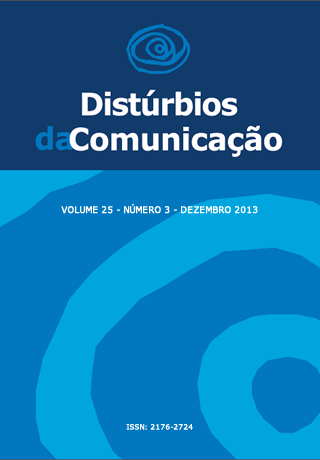Contribuição da ênfase na sílaba tônica para a fluência da fala e da leitura
Palavras-chave:
Voz, Fala, Falar em Público, Treinamento Fonoaudiológico, ComunicaçãoResumo
Introdução: Dada a constante evolução do mundo moderno e crescente competitividade, empresas e diversos profissionais estão buscando o aperfeiçoamento na fluência da fala e da leitura. Objetivo: Avaliar a contribuição da ênfase na sílaba tônica para a fluência na fala espontânea e na leitura, a partir da redução da sua duração. Para esse fim, considerar-se-ão os fundamentos do Método Unidade em Movimento. Material e métodos: Foram selecionadas 21 estudantes universitárias, divididas em três grupos. No G1 (n=7) foi trabalhada a ênfase na sílaba tônica e no G2 (n=7) a velocidade de fala; o G3 (n=7) constituiu o grupo controle. Os três grupos vivenciaram a postura (expressão corporal e alinhamento postural) e a respiração. As leituras do mesmo texto foram gravadas no estúdio de rádio do Centro de Multimídia da Universidade Veiga de Almeida e os discursos da fala espontânea foram filmados. Posteriormente, as amostras de vídeo e de áudio foram submetidas à análise perceptual realizada por quatro juízas fonoaudiólogas treinadas no Método Unidade em Movimento. Resultado: O G1 apresentou aumento significativo, do pré para o pós-treinamento, no uso da ênfase para a fala espontânea (p=0,015) e para a leitura de texto (p=0,031), e queda expressiva da disfluência na leitura de texto (p=0,015). Não houve variação significativa do pré para o pós-treinamento nos G2 e G3. Conclusão: Os resultados evidenciaram que a diminuição da duração da sílaba tônica contribuiu para a fluência na leitura de texto, e apontaram uma tendência da redução da disfluência na fala espontânea.
Downloads
Métricas
Downloads
Publicado
Edição
Seção
Licença
Copyright (c) 2013 Gisele de O. Stumpf, Domingos S. F. de Oliveira

Este trabalho está licenciado sob uma licença Creative Commons Attribution 4.0 International License.









